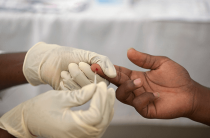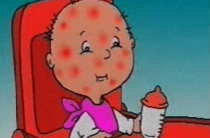In today's world, it is difficult to find a disease that is as common as an allergy. Already today, every fifth person on the planet has experienced various kinds of allergic phenomena. Many do not show due responsibility, knowing that they suffer from allergies. A specialist is contacted only when the symptoms of allergic reactions cause significant discomfort.
This situation is fundamentally wrong, since not all symptoms of allergic disorders are harmless.
Moreover, women who are pregnant should not leave this disease unattended. Pregnancy can affect allergy symptoms ambiguously, in particular, provoke an increase in allergic symptoms. Treatment of allergies during pregnancy, without fail, takes place under the supervision of specialists. At the same time, the interaction of an allergist and an obstetrician-gynecologist who manages pregnancy is necessary. Joint interaction will allow choosing the most optimal treatment tactics that will be safe for both the mother and her unborn child. Allergies and the Child Most parents know that there are diseases that can be inherited from the mother, father or other close relatives of the child. For this reason, people who have a history of allergic diseases will find it extremely useful to know what the chances of an allergic disease caused by hereditary factors are and, of course, what measures can be taken.
And so, if one of the parents has a history of an allergic disease, then the chance of hereditary transmission is about 40%. This unfavorable probability is doubled if both parents are allergic. In the case when there is a history of allergies in any of the close relatives, the chances that this will provoke an allergy in a child are about 10%. It is impossible to predict which allergen will provoke an allergic reaction in a child, because with the hereditary transmission of allergies, the chance of an immune disorder itself, and not a specific allergic disease, increases.
Factors such as poor environmental conditions in the child's place of residence; lack of breastfeeding and a pathological craving for cleanliness also contribute as possible provocateurs of an allergic reaction. It is desirable to protect the child from various synthetic cosmetics and household chemicals, as well as non-natural foods, including dyes, preservatives and other artificial substances. These factors have a destabilizing effect on the baby's immunity, which can provoke allergic disorders.
The allergens themselves, to which the mother is sensitive, do not have a provoking effect on the fetus, which is reliably protected by a special placental membrane that absorbs and neutralizes these components. But any allergy symptoms cause a deterioration in the mother's well-being, which can provoke a deterioration in the condition of the fetus, which is sensitive to any transformations occurring in the mother's body.
The development of allergies during pregnancy
Pregnancy is a special state of the body, which makes various changes in the functioning of organs and systems. These changes also affect the immune system of the mother's body, which is precisely the main culprit in the development of allergic reactions.
Pregnancy affects allergies in a very ambiguous way, therefore, in modern medical practice, the following options for the development of the disease are distinguished:
- Pregnancy does not affect the manifestations of allergies, which do not undergo changes and proceed as usual;
- Pregnancy contributes to the appearance of allergic reactions to allergens that previously did not cause allergy symptoms. So, often a woman has allergic reactions to those components of food that a woman used calmly before pregnancy. Basically, this picture is typical for the first 10-14 weeks of pregnancy. At this time, the woman's body only adapts to the changes that pregnancy causes. This period often passes with various malfunctions in the body.
- Pregnancy temporarily relieves allergy symptoms. For some women, pregnancy causes severe stress for the body, which is accompanied by an increased release of cortisol. This hormone, in the human body, eliminates inflammatory reactions, relieves allergy symptoms, and reduces the production of antibodies.
- Pregnancy reduces allergy symptoms.
- Pregnancy exacerbates allergy symptoms.
None of these options can be predicted with 100% accuracy. The behavior of the female body during pregnancy is an extremely unpredictable thing, therefore, even experienced doctors find it difficult to answer this question.
The effect of allergy pills during pregnancy
Unfortunately, many allergy pills that are safe for humans, in the normal state, in pregnant women cause a negative effect on the fetus, or on the course of pregnancy. The effect of the drug on the development of the embryo is called teratogenicity. Allergy pills are divided into several classes, depending on the strength of the teratogenic effect:
Category A - these are tablets that have not been found to have a teratogenic effect in the course of experimental and practical studies. Please note that we are not talking about the absence of a teratogenic effect, but that it has not been detected. No one is able to give an absolute guarantee that such influence does not exist.
Category B - pills that did not show teratogenic effects experimentally, but there is no practically confirmed information about this.
Category B - allergy pills that have shown an effect on the fetus as a result of the experiment, but at the moment there is no practical information on this issue.
Category D - drugs, the risk of not using which is higher than the risk of dangerous effects on the embryo.
Category B - pills that are not used during pregnancy.
The use of allergy pills during pregnancy
The appointment of tablets and other drugs should be handled exclusively by a doctor. Even if you used these drugs before pregnancy and did not feel a negative effect on the body. Self-medication at the moment is especially dangerous, because it can provoke a negative impact on the health of the child and the course of pregnancy. Tavegil - is used during pregnancy only to stop such dangerous reactions as Quincke's edema and anaphylactic shock. Its constant use can lead to various pathologies of the nervous system in a child. Dimedrol - is not used during the last trimester of pregnancy, as it can stimulate uterine contractions, provoking the appearance of a miscarriage. Astemizole - is a toxic agent that leads to damage to the fetus. It is not used to treat allergies in pregnant women. Terfenadine - leads to a decrease in the normal body weight of the fetus, therefore it is also not used to treat allergies in pregnant women.
What allergy pills are used to treat pregnant women?
First, it should be noted that all drugs are used to treat allergies, only after careful consideration of the various risks that the use of pills and other drugs may carry. The appointment is carried out only on the condition that the risk of not using the drugs is higher than that which they provide.
Suprastin is an effective drug for the treatment of allergies. The peak of its anti-allergic action reaches a maximum 2 hours after ingestion. This drug is metabolized by the kidneys, therefore, it is used with caution in diseases of this organ. The active substance suprastin has an effect on the central nervous system, which in practice is manifested by weakness, drowsiness, and a decrease in the ability to focus attention.
Claritin is an effective anti-allergic drug that reliably relieves allergy symptoms, eliminates itching and other consequences of an allergic reaction. The active substance (loratidin) does not penetrate into the brain, therefore it does not have a depressing effect on the central type of the patient's nervous system.
Fexofenadine is a modern antiallergic drug. It rarely inhibits the processes of excitation of the central nervous system. It is not used in the treatment of patients with renal insufficiency. It can also rarely cause disruption of the gastrointestinal tract.
Prevention of allergies in children
A mother who herself suffers from allergies should pay great attention to the prevention of allergies in a child. During pregnancy and lactation, it is imperative to adhere to a special diet that excludes foods that provoke an allergic reaction. An important place is occupied by breastfeeding, as a prerequisite for the formation of a healthy immunity of the child. The transition from breastfeeding to the use of natural products should occur gradually, using an adequate range of products and their gradual introduction into the diet.
In no case should the child be exposed to direct sunlight in hot weather, as well as in the cold. Temperature factors, when exposed to the sensitive skin of a child, can provoke symptoms of urticaria.
It is mandatory for a mother to undergo special immunotherapy, even before she plans to conceive. This method allows you to achieve temporary desensitization of immunity, due to the systematic introduction of a small amount of the allergen intramuscularly, in the form of a solution. The results from immunotherapy can last for several years, which will be very helpful for a woman who is planning a pregnancy.
A woman who suffers from respiratory allergies (allergy to dust, plant pollen, mold fungi) needs to pay attention to the prevention of allergies, which is carried out by the barrier method. This method involves the elimination of contact with the allergen, with the help of constant wet cleaning, air purification in the room, frequent change of bed linen, washing the sinuses with saline.
Places where stinging insects accumulate should be avoided. Their venom has a high allergenic potential and can cause severe manifestations in the form of generalized urticaria, anaphylactic shock and angioedema. Therefore, they must be avoided during pregnancy with great care, since these symptoms are fraught with the development of fetal hypoxia.















